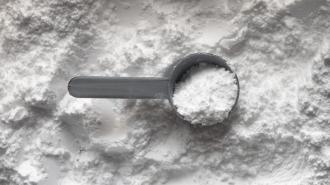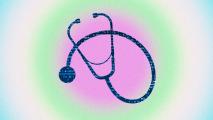While most dietary supplements are a waste of money — sold at premium prices, yet returning little to no health benefit to the consumer — there are a few that buck the trend. Creatine is one of them.
The compound, commonly sold in powdered form, is relatively inexpensive, quite safe at recommended doses, and remarkably effective at delivering its marketed benefits: improving athletic performance, speeding recovery, and preventing injury.
Creatine is naturally synthesized in the liver, kidney, and pancreas at a rate of about one gram per day. Consuming milk, red meat, seafood, and nuts as part of a balanced, omnivorous diet can contribute up to another two grams per day. However, one can easily and safely consume a lot more of it through powders blended into liquids. Supplementing up to 30 grams a day in this fashion has been found to be safe and well-tolerated over the long-term (at least five years).
A bounty of evidence shows that taking creatine supplements raises the threshold of fatigue, which particularly comes in handy for explosive activities like weightlifting and sprinting. Creatine does this by rapidly replenishing adenosine triphosphate (ATP), muscle cells’ primary source of energy.
But what once just caught the attention of gym rats and competitive athletes has, over the past couple decades, peaked the interest of health experts. Researchers have found significant stores of creatine not only in skeletal muscles, but also in the brain, hinting that consuming more of the compound could yield unforeseen advantages.
Animal studies showed promise, so scientists have more recently started conducting experiments in humans. Taking five grams of creatine per day for six weeks was found to drastically enhance both working memory and intelligence in a double-blind, placebo-controlled study of 45 young adult vegetarians. A systematic review of other human trials backed this result up. There’s also evidence that creatine intake can shorten symptoms of concussion. When used in conjunction with exercise, creatine improves blood sugar metabolism more effectively than exercise alone. Very preliminary research hints that the compound could lessen the severity of cardiovascular disease.
Could creatine treat depression?
By far the most compelling potential use for creatine outside of exercise is for the treatment of depression. A decade ago, a small, eight-week study conducted in South Korea had 52 women take either an antidepressant or that same anti-depressant with creatine. By the end of the study, half of the women in the creatine group were depression-free, a success rate double that of the group only receiving the antidepressant.
Two years ago, researchers at the University of Utah analyzed data from the National Health and Nutrition Examination Survey from 22,692 individuals over the age of 20, finding that “after controlling for demographic and lifestyle variables, the risk of screening positive for depression was 31% lower among adults in the highest, compared to the lowest, quartile of creatine consumption.” The highest-quartile consumers got about one gram of creatine per day from their diet, while the lowest quartile consumers only got 0.15 gram. They hypothesized that creatine might boost brain energy metabolism and capacity.
More studies are forthcoming, testing creatine both as an additive treatment coupled with more conventional depression medications and as a standalone treatment in higher doses, something like 20 to 40 grams per day. While it’s much too early to conclusively tout creatine as a treatment for depression, a trifecta of factors — low-risk, high-reward, affordable cost — make it promising indeed.
This article was reprinted with permission of Big Think, where it was originally published.






